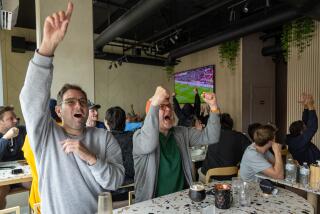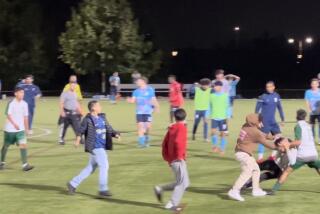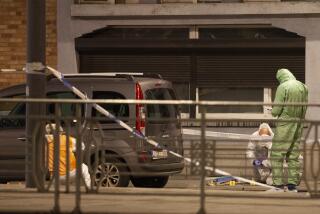Brawling British Soccer Fans--Liquor, Machismo
LONDON â British soccer fans of the kind that precipitated Wednesday nightâs bloody rioting in Brussels are widely regarded as the scourge of Europe.
Why? Why do the civilized British send forth sports enthusiasts who over the years have left a trail of violence and bloodshed across the Continent?
Actually, according to sociologists who have studied the problem, soccer violence is as British as roast beef and Yorkshire pudding.
A team of researchers at Leicester University recently published a study showing that many young working-class males look on a soccer match not so much as a contest between the players on the field as an occasion to demonstrate their own masculinity. They regard an aggressive attitude toward the fans of the opposing team as proof of their manhood--and their fighting stance is admired by their friends.
The researchers found that fan aggression can be intensified by the concept of âhomeâ and âvisitingâ teams. Home team fans see themselves as defending their turf against invaders, while the visiting clubâs supporters think of themselves as intrepid challengers in dangerous territory.
This attitude, sports observers say, becomes sharpened when British fans travel to the Continent. There they tend to drink too much, like sailors ashore in a foreign port, and they are given to tearing up towns and picking fights with local people.
A few nights in jail, according to this view, not only does not teach the violence-prone fans a lesson, it increases their importance in the eyes of their fellow supporters.
Wednesdayâs match in Brussels between Liverpool and Juventus of Turin was a case in point. Many of the Liverpool fans arrived in Brussels after having been drinking and are reported to have continued to drink through the day. Many were obviously drunk when they entered the stadium for the evening game.
Mixing in Terraces
The situation was aggravated by the fact that the Belgian authorities sold tickets to anyone who wished to buy, allowing British and Italian fans to mix together in the terraces, the standing-room-only spectator areas at European soccer stadiums. Tickets for the terraces are the cheapest and, in matches involving British teams, they are almost always the principal scenes of trouble.
They compare with the end zone seats at an American football game or the bleachers in a baseball park. In European soccer, they are generally reserved for the fans of one team or the other, rarely both. Occupants of the higher-priced seats are usually better behaved.
In Britain, police and stadium authorities take great care to keep the teamsâ fans separated--before, during and after the match. Home club supporters are often kept in the stadium until the visiting fans have boarded trains or buses for home.
Taunting the Others
In Brussels, with the Italian and British fans mixed, trouble developed quickly. Supporters of both clubs taunted the others until the Liverpool supporters rushed the Italians, driving them up against a wall that collapsed on them.
Some British observers complained that the Belgian soccer officials should have anticipated the problem, should have made sure that the fans were segregated, should have seen to it that the police were in position to prevent the attack.
And British sports specialists say that soccer violence is not restricted to Britain. There have been casualties at soccer matches in Turkey, the Soviet Union, China and, especially, in Latin America.
Some liken soccer violence in Britain to the urban teen-age gang warfare that erupts in American cities.
Rob Hughes, one of the most knowledgeable of British soccer writers, asks rhetorically: âWhat is wrong with the British?â And he replies: âA glib answer is that we have hooligans and strikes where others are bedeviled with terrorism and street shootouts, that football is our outlet for a violence that manifests itself worldwide. Yet we cannot, we dare not, for an instant become complacent or understate the seriousness of the problem.â
âIncarnation of Violenceâ
John Cohen, a professor of psychology at the University of Manchester, says of the violent behavior that sometimes accompanies soccer matches, âThe game itself is an incarnation of violence; the match a sort of Saturday poultice bringing a weekâs frustration to a head.â
Other sociologists believe that the high unemployment rate, particularly among working-class young people, contributes to the frustrations that spill over into violence on the playing field. And some see it as a kind of pressure valve that has taken the place of going off to war.
In fact, an International Olympic Committee study of sports violence undertaken last year found that as large-scale war between advanced countries--particularly those with nuclear weapons--has become more unthinkable, sports rivalry has become a surrogate for conventional political rivalry. Fans tend to identify national prestige and success with the fortunes of their countryâs teams, and this is liable to boil up into strong feelings of aggression.
Paradoxically, events like the Olympics that are supposedly designed to foster international harmony may become the occasion instead to intensify nationalistic feelings that sometimes lead to poorer relations between nations or violent outbreaks in crowds of sports spectators.
Like Medieval Plague
Speaking specifically of soccer violence, Geoffrey Parkinson, for 30 years a London probation officer, said: âI see hooliganism . . . like a medieval plague. It might subside from time to time but will keep recurring because all societies have a problem with youth.
âTo todayâs unemployed sitting in a housing project, with moaning parents, no future and the continuous example on television of street warfare in Northern Ireland, the film industryâs devotion to fictionalized violence must contain an excitement envied by youth.â
Parkinson said that soccer violence in some instances represents a ritualized capture by fans of their rivalsâ position.
âI suspect,â he said, âthat (soccer) as a game has sunk into the background, that, rather in the way middle-aged ladies watch fixed wrestling matches, the public is being terribly indignant--but at the same time excited--by these terrace encounters.â
Decline in Sportsmanship
Some sports commentators suggest that a decline in sportsmanship on the field is partly responsible for encouraging hooliganism among the fans.
According to a well-known British referee, Clive Thomas, soccer will appeal to the baser elements of the fans as long as the players try to get away with murder on the field.
âIt is wrong,â he said, âfor the (soccer) establishment to point to government and magistrates before putting their own house in order. By that I mean they have to deal with managers who condone the actions of players, and also refs who do not take action.â
There are some, among them Prime Minister Margaret Thatcher, who have called for stiffer jail sentences as a way of curbing soccer violence. But others believe the violence reflects a profound problem that will not easily be solved.
Richard Dennison of the Gillingham Football Club put it like this: âYou can have fences to keep people off the pitch (field), extra police, no alcohol, but if they have it in their minds to cause trouble, they will.â
Times staff writer Kenneth Reich in Los Angeles contributed to this story.






